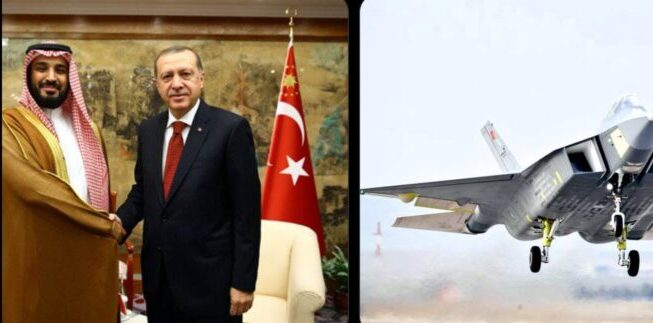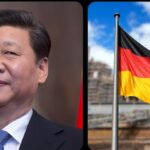Saudi Arabia is considering the purchasing of 100 units 5th generation KAAN fighter jets from Turkey
Saudi Arabia Eyes Purchase of 100 KAAN 5th-Generation Fighter Jets from Turkey: A Strategic Shift in Middle Eastern Defense
In a significant development in Middle Eastern defense, Saudi Arabia is reportedly considering the acquisition of 100 KAAN 5th-generation fighter jets from Turkey. This potential deal marks a major shift in the region’s military landscape, as Saudi Arabia, traditionally a major customer of Western defense manufacturers like the U.S. and Europe, looks to diversify its military partnerships and strengthen its defense capabilities with cutting-edge technology from Turkey.
The KAAN fighter jet is a next-generation, stealth multirole combat aircraft developed by Turkey’s aerospace industry, marking a significant leap forward in Turkey’s defense and aviation technology. If finalized, the deal would not only bolster Saudi Arabia’s air capabilities but also represent a strategic realignment in the Kingdom’s defense procurement, as it seeks to enhance its military strength amid increasing regional tensions and evolving security threats.
In this article, we will explore the potential deal’s implications for Saudi Arabia, Turkey, and the broader Middle Eastern geopolitical environment.
The KAAN Fighter Jet: Turkey’s Technological Milestone
The KAAN fighter jet is a product of Turkey’s growing defense industry, which has increasingly become an important player on the global stage. Developed by Turkish Aerospace Industries (TAI), the KAAN is a 5th-generation fighter jet designed to compete with the most advanced aircraft in the world, such as the F-35 and F-22 from the United States.
Key features of the KAAN fighter include:
- Stealth Technology: Like other 5th-generation fighters, the KAAN is designed with stealth capabilities, making it harder for radar systems to detect. This provides a significant tactical advantage in combat.
- Advanced Avionics: The aircraft boasts cutting-edge avionics and sensor fusion technology, enhancing situational awareness and operational efficiency in both air-to-air and air-to-ground missions.
- Supercruise Ability: The KAAN is capable of flying at supersonic speeds without the need for afterburners, a key feature for extended range and fuel efficiency.
- Multirole Capability: The aircraft is designed to perform a variety of missions, including air superiority, ground attack, and reconnaissance, making it highly versatile in modern warfare scenarios.
- Turkish Self-Reliance: The KAAN is part of Turkey’s larger effort to reduce its reliance on foreign military technology, especially in the wake of its exclusion from the F-35 program by the U.S. in 2019 due to its purchase of Russian S-400 missile defense systems.
Saudi Arabia’s Defense Modernization and Strategic Shift
Saudi Arabia’s interest in purchasing 100 KAAN jets underscores its commitment to modernizing and diversifying its defense portfolio. Traditionally, Saudi Arabia has been a major customer of U.S. and European arms manufacturers, with its military heavily reliant on U.S.-made F-15 fighter jets and Patriot missile defense systems. However, the potential deal with Turkey signals a growing shift in Saudi Arabia’s defense procurement strategy, aiming to secure high-tech systems from multiple sources.
Several factors likely explain this strategic pivot:
1. Desire for Advanced Military Capabilities
Saudi Arabia’s military modernization has been driven by its need to maintain air superiority in a volatile region. The potential acquisition of 100 KAAN jets would significantly enhance its air force capabilities, providing it with a cutting-edge multirole platform that can effectively counter emerging threats, such as drones, advanced fighter jets, and missile systems from regional adversaries.
Saudi Arabia has also faced growing security challenges, particularly with Iran and its allies, and has been increasingly concerned about potential threats from ballistic missiles, cyber warfare, and evolving air defense systems. With its increasing focus on self-reliance in defense, the purchase of KAAN jets could enhance Saudi Arabia’s deterrence capabilities and allow it to operate in a more technologically advanced and autonomous manner.
2. Diversification of Defense Suppliers
The Saudi Kingdom has long been dependent on the U.S. and European countries for its defense needs, but there are multiple reasons why Saudi Arabia may now be looking toward Turkey for advanced military technology. One key factor is political. As relations between the U.S. and Saudi Arabia have fluctuated over the years, especially during the administration of President Joe Biden, Riyadh may seek to balance its partnerships by strengthening ties with other countries, including Turkey, which has also been a regional power broker in the Middle East.
Additionally, Turkey’s defense industry has gained a reputation for producing high-quality, affordable military systems that can rival those of the West. Given the potential cost-effectiveness of Turkey’s defense products, the acquisition of Turkish-made fighter jets would also provide Saudi Arabia with an opportunity to acquire advanced technology without the often complex and expensive procurement processes that can come with purchasing from the U.S. or European defense firms.
3. Strengthening Saudi-Turkish Relations
The potential deal also signals a deepening bilateral relationship between Saudi Arabia and Turkey. Although the two countries have had diplomatic differences in the past, particularly in relation to regional conflicts like the Syrian Civil War and the Qatar blockade, there has been a growing effort to improve relations in recent years. Both countries share common interests in regional stability, economic cooperation, and military collaboration.
Turkey, under the leadership of President Recep Tayyip Erdoğan, has also sought to assert its influence in the Middle East, positioning itself as a key player in defense technology and military power. Strengthening ties with Saudi Arabia, a regional heavyweight, could further solidify Turkey’s position as a leading supplier of advanced military systems.
Implications for Regional Security and Geopolitics
The potential sale of 100 KAAN fighter jets to Saudi Arabia has several important implications for both regional security and global geopolitics.
1. Regional Power Dynamics
The acquisition of advanced fighter jets by Saudi Arabia would likely alter the balance of power in the region. Saudi Arabia and Iran have long been engaged in a rivalry for regional dominance, with both nations seeking to strengthen their military capabilities. The purchase of KAAN jets would give Saudi Arabia a technological edge, particularly in air superiority, potentially shifting the military balance in favor of Riyadh.
Moreover, Saudi Arabia’s growing military capabilities could impact the security situation in Yemen, where Saudi forces have been involved in a protracted conflict with Iranian-backed Houthi rebels. With the addition of more advanced fighter jets, Saudi Arabia may be better positioned to respond to external threats and secure its borders against hostile actions.
2. Impact on U.S.-Turkey Relations
Turkey’s defense sales to Saudi Arabia could complicate its relationship with the United States. In recent years, U.S.-Turkey relations have been strained due to Turkey’s decision to purchase the Russian S-400 missile defense system, which led to its removal from the F-35 program. The purchase of 5th-generation fighter jets by Saudi Arabia from Turkey may raise further concerns in Washington, particularly regarding the military technologies being shared and the potential for an increasing defense partnership between the two countries.
However, the U.S. may also view the deal as a way to counterbalance Iran’s military influence in the region. While the U.S. has been a longstanding ally of Saudi Arabia, its relationship with Turkey has also been marked by cooperation on various military and diplomatic fronts, particularly in addressing issues related to ISIS and NATO security concerns.
3. Global Arms Market Trends
The potential sale of KAAN jets to Saudi Arabia underscores Turkey’s growing influence in the global arms market. Over the past decade, Turkey has made significant strides in increasing its military exports, including drones, missile defense systems, and advanced fighter jets. A successful deal with Saudi Arabia could enhance Turkey’s position as a key defense supplier not only in the Middle East but also on the global stage, competing with major powers like the U.S., Russia, and China.
The deal could also pave the way for similar sales to other countries in the region, potentially reshaping the Middle East’s defense landscape and creating new opportunities for Turkey to establish itself as a regional security provider.
Conclusion: A Game-Changing Deal for Saudi Arabia and Turkey
If finalized, the purchase of 100 KAAN fighter jets by Saudi Arabia would be a landmark deal, signaling both a strategic shift in Saudi Arabia’s defense strategy and a strengthening of military ties between Riyadh and Ankara. It would enhance Saudi Arabia’s military capabilities, diversifying its sources of advanced defense technology and reducing its dependence on traditional Western suppliers.
For Turkey, the deal would be a significant achievement in its efforts to position itself as a leading exporter of cutting-edge military technology, further asserting its influence in the Middle East and beyond. As the Middle East continues to be a hotspot of geopolitical competition and security challenges, the potential deal highlights the growing importance of defense diversification and technological self-reliance for countries like Saudi Arabia, which are navigating complex regional dynamics.

















Post Comment